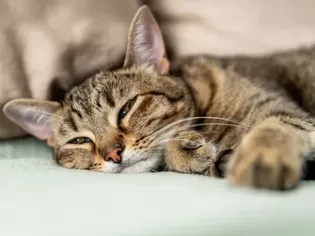Cat Behavior Changes That Might Mean Something's Wrong
Updated on 04/26/24

Unlocking the Secrets: When Your Cat's Behavior Takes an Unexpected Turn
Cats, those enigmas of the animal kingdom, often communicate through subtle changes in their behavior. While some tweaks are simply quirks, others may signal underlying health issues or emotional distress. It's crucial to pay attention to these telltale signs and consult a veterinarian or animal behaviorist to ensure your feline companion's well-being.
Examples of Behavior Changes to Watch for:
1. Altered Eating Habits:
* Sudden refusal to eat
* Abrupt changes in appetite (eating more or less)
* Dietary preferences that differ from the norm
2. Vocalization Changes:
* Excessive meowing or howling
* Uncharacteristic silence or lack of vocalization
* Changes in the pitch or volume of meows
3. Hygiene Deviations:
* Neglecting grooming and becoming unkempt
* Excessive grooming or licking
* Changes in litter box habits (urinating or defecating outside litter box)
4. Sleep Disturbances:
* Sleeping more or less than usual
* Restlessness or difficulty settling down
* Changes in sleep patterns (sleeping at unusual times)
5. Behavioral Patterns:
* Increased hiding or avoidance behavior
* Excessive clinginess or withdrawal
* Changes in playfulness or energy levels
* Aggression towards humans or other animals
What These Changes Might Mean:
* Medical Conditions: Dental problems, gastrointestinal issues, pain, infections, cancer
* Emotional Distress: Anxiety, stress, fear, depression
* Environmental Factors: Changes in household routine, new pets or people, relocation
* Behavioral Issues: Fear-based aggression, compulsive disorders, displacement behaviors
Importance of Seeking Professional Help:
Ignoring behavioral changes can have detrimental effects on your cat's health and well-being. A veterinarian can rule out any underlying medical conditions through examinations, blood tests, and imaging. If no medical issues are found, an animal behaviorist can help identify and address emotional or behavioral triggers.
Tips for Monitoring Your Cat's Behavior:
* Track daily habits and record any changes.
* Observe your cat's body language and facial expressions.
* Provide a safe and supportive environment.
* Avoid punishment or negative reinforcement.
* Seek professional advice if you notice any significant or persistent behavior changes.
Conclusion:
Understanding your cat's body language and behavior is the key to providing optimal care and well-being. Pay attention to any subtle changes and consult a veterinarian or animal behaviorist if you notice anything out of the ordinary. By addressing these concerns promptly, you can help your beloved feline companion live a long, healthy, and happy life filled with love and companionship.
Explore More Pets

Cat Behavior Problems
How to Stop Aggression in Kittens

Long-Haired Cat Breeds
Siberian Cat: Breed Profile, Characteristics, & Care

Cat Behavior Problems
How to Stop Kittens From Scratching and Biting

Long-Haired Cat Breeds
Turkish Angora: Cat Breed Profile, Characteristics & Care

Basic Training
How to Socialize Your Kitten

Short-Haired Cat Breeds
Cute Pictures & Facts About Calico Cats & Kittens

Litter Box Training
Training Your Kitten to Use the Litter Box

Long-Haired Cat Breeds
10 Fun Facts About White Cats